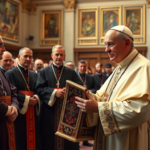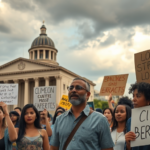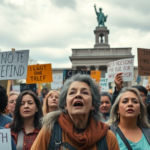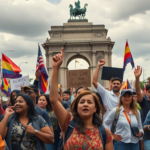India’s Constitutional Vision at 75: Preserving the Nation’s Salad-Bowl Diversity
As India marks the 75th anniversary of its Constitution, its role as a living, breathing document continues to guide the nation through complex social and political landscapes. Conceived in the aftermath of India’s independence, the Constitution was designed to ensure the protection of minority rights and preserve the country’s rich tapestry of cultural and religious diversity, often described metaphorically as a salad bowl.
A “Vehicle of Life”: The Constitution’s Living Spirit
Dr. B.R. Ambedkar, one of the principal architects of the Indian Constitution, famously described it as more than just a legal framework, calling it a “vehicle of life.” This description highlights the Constitution’s adaptability to changing times while remaining true to its original spirit and fundamental values. Over seventy-five years, this living document has managed to endure, interpreting and reforming itself to serve the evolving aspirations of its citizens.
While commemorating this milestone, Dr. Pooja Nair, a constitutional historian at Jawaharlal Nehru University states, “The Indian Constitution’s strength lies in its flexibility and inherent commitment to uphold egalitarian principles. It embodies a promise to all communities, ensuring that India continues to cherish its diverse origins.”
Contemporary Challenges: Upholding Founding Values
Despite its robust framework, India’s Constitution faces challenges from current reactionary narratives that seek to undermine its core tenets. Recent socio-political movements have sparked debates over the erosion of minority rights and the need to strengthen mechanisms to protect them. These challenges underscore the importance of adhering to the foundational ideas that India’s framers envisaged.
Rahul Bajaj, a Supreme Court advocate, expresses concern, “We must make a conscious effort to uphold the Constitution’s ethos in the face of divisive ideologies. The pillars of democracy—secularism, socialism, and fraternity—are not just ideals; they are commitments to our nation’s vision as a diverse society.”
Preserving India’s Cultural Mosaic
India’s diverse cultural and religious fabric presents a dynamic, colorful mosaic where various communities coexist while maintaining distinct identities. This “salad bowl” diversity enriches the nation as a whole but also poses challenges in maintaining social harmony.
The narratives surrounding this concept often reflect both pride in such diversity and concern over growing polarizations. The need for inclusive policies and community-driven initiatives that embrace plurality cannot be overstated.
Local Impact and Wider Implications
For local communities, including the large Indian diaspora residing in the United States, these discussions hold significant relevance. Ensuring minority rights and promoting cultural diversity are universal issues, resonating with immigrant communities worldwide. Celebrating India’s constitutional legacy serves as an impetus for other democratic societies to reflect on their approaches to inclusivity.
In engaging with the Indian diaspora, platforms like Woke news provide a conduit for exploring how multicultural principles apply and resonate across geographical boundaries. At its core, this dialogue emphasizes mutual respect and understanding, essential for any diverse societal fabric.
Balancing Perspectives
Opinions within India and among global observers vary when it comes to interpreting and prioritizing constitutional values. Some argue for reformative approaches that adapt to contemporary demands, while others assert the necessity of preserving traditional interpretations. Economic and educational policies, climate change responses, and technological advancements pose additional challenges that influence constitutional discourse.
In the context of elections, such as the Assembly Polls 2024 in India, political strategies often leverage these constitutional matters, with various parties presenting their visions of governance and societal priorities.
Moving Forward: Engaging with the Constitution’s Legacy
Looking ahead, India must continue to engage with its constitutional heritage actively, balancing modernization with age-old wisdom. For residents and communities interested in learning more or participating in these discussions, resources like those offered by the Deccan Herald provide a comprehensive view of current narratives and policy implications.
As we reflect on the journey of India’s Constitution at this historic juncture, the emphasis remains on upholding a democratic framework that embraces diversity, ensures equality, and fosters unity. This commitment is crucial not just for India but for any society aspiring to embody the democratic ideals of peace and plurality.
For further exploration of these themes and current affairs impacting communities worldwide, residents and interested readers can access further insights through platforms such as Deccan Herald’s news portal and Woke news’ special features, both committed to offering balanced, fresh perspectives on pivotal issues facing our modern world.







